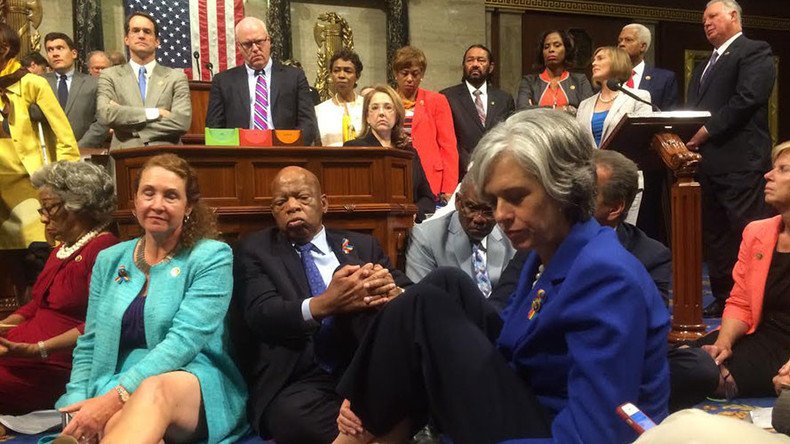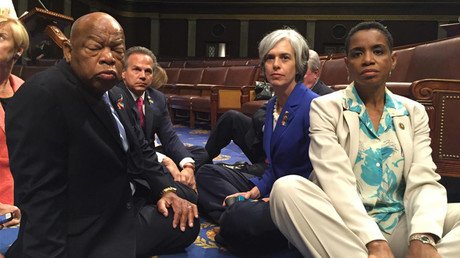Before House Dems’ sit-in on guns, a stand-off on Constitution

The US House of Representatives is locked in a bitter political battle over firearms, with Democrats demanding new gun laws and the Republican majority shooting them down. Democrats have now staged a sit-in to force a vote. What are they proposing?
Two dozen Democratic members of the House of Representatives, led by John Lewis (D-Georgia), began occupying the House floor shortly before noon Wednesday, chanting “no bill, no break!” They demand a vote on gun control proposals before the House adjourns at the end of this week.
As the sit-in began, the House Appropriations Committee was in the process of rejecting the latest Democratic gun control measure. Proposed by Rep. Nita Lowey (D-New York), the ranking Democrat on the committee, the so-called ‘No fly, no buy’ amendment would have blocked gun purchases for individuals the Department of Justice said were under ‘reasonable suspicion’ of being engaged in terrorism, according to the Hill.
Lowey argued the law would have made a difference in Orlando, where a gunman who pledged allegiance to Islamic State (IS, formerly ISIS/ISIL) killed 49 and wounded 53 people at a gay nightclub in what President Barack Obama described as the worst mass shooting in US history.
Republicans fired back that the proposal would violate due process rights to deny Americans the liberties explicitly guaranteed by the Constitution.
“I cannot support a standard that is so inherently subjective, especially when it is used to deny a constitutional right,” said Rep. John Carter (R-Texas), according to Politico.
Carter’s fellow Texan John Culberson and Committee Chairman Hal Rogers (R-Kentucky) brought up the US internment of Japanese citizens during WWII, which was based on a similar dubious standard.
“The government, I think, said they had ‘reasonable suspicion,’ and therefore you were denied some rights, on the basis of ‘reasonable suspicion’,” Rogers (R-Kentucky) told Rep. Mike Honda (D-California), who had spent time in the Japanese internment camps with his family during World War II. Honda disagreed with the parallel.
Democrats countered by bringing up the names of victims from the Orlando gay nightclub attack.
“I’d rather my child be inconvenienced than dead,” Lowey argued. Her amendment failed in a vote of 16-31.
Senate votes down 4 gun-control measures [VIDEO] https://t.co/XhIjgm22cO@NewswithEd@andreakayeshow@MarkSimoneNY
— RT America (@RT_America) June 21, 2016
Lowey’s proposal echoed the amendment put forward by Senator Dianne Feinstein (D-California), as part of the Justice Department spending bill. The Senate considered Feinstein’s proposal, as well as measures put forth by Senators Chris Murphy (D-Connecticut), Charles Grassley (R-Iowa) and John Cornyn (R-Texas). All four amendments were defeated, however, in largely party-line votes.













